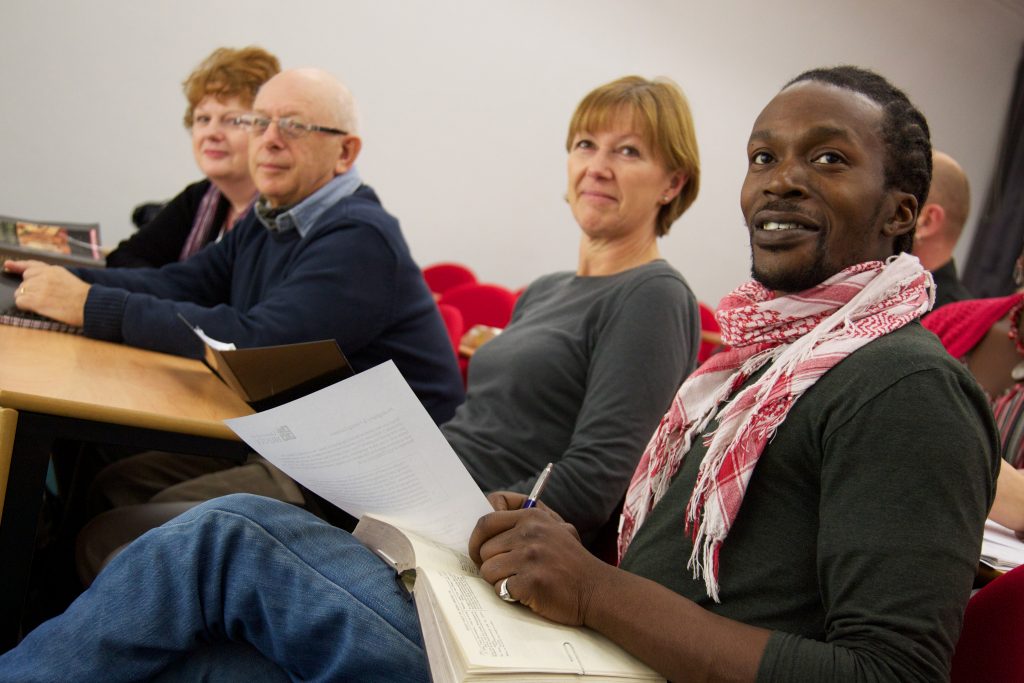
Tom Sperlinger is Reader in English Literature and Community Engagement at the University of Bristol.
A friend of mine recently posted a link on Facebook to a Wall Street Journal article, ‘Blue Feed, Red Feed’, which allows readers to pick a topic – Hillary Clinton, say, or abortion – and see how the ‘other’ side of Facebook is talking about it. My friend wrote:
“I and everyone I know (well, nearly everyone) finds Trump utterly disgusting, but this isn’t necessarily a good thing. For others worried that we all (mostly) agree with each other, this is a useful side-by-side comparison of liberal and conservative Facebook.”
I looked at the split screen on the topic of ‘guns’ and saw posts I recognised on the ‘blue’ side condemning Republican measures to reduce checks on those buying firearms. The ‘red’ side, meanwhile, included a link to a Federalist Papers website article criticising ‘leftists who don’t like guns’.
The divides that were exposed by Trump and Brexit are complex. Yet, in both votes, two sides emerged that were incomprehensible to each other and they split, above all, along levels of education.
David Runciman wrote in October: “Voters with postgraduate qualifications split 75 to 25 in favour of remain. Meanwhile, among those who left school without any qualifications, the vote was almost exactly reversed: 73 to 27 for leave.” He concluded: “Class still matters. Age still matters. But education appears to matter more.” The figures are similarly instructive for the US election.
Expertise and experience
The link between voting intention and level of prior education is not surprising. We are witnessing a crisis in what forms of knowledge we hold in common as a society.
Michael Gove defined the emotional angst behind ‘Vote Leave’ as being driven by fatigue with experts. Within universities, the distress at recent events is partly that so much expertise is now being disregarded, perhaps most acutely on climate change.
This crisis has been recognised for some time: efforts at public engagement in research have been driven by fear that key scientific advances failed to gain public trust. Yet these efforts often construct ‘the public’ as remaining outside the university. Meanwhile, the university classroom remains a space in which only a limited range of voices can participate on equal terms.
There are alternatives, as an older tradition in universities reminds us. In a 1968 lecture, ‘Education and Experience’, E.P. Thompson wrote about the extra-mural tradition, in which courses were offered at various times and locations to people who were not otherwise students. He saw it as fulfilling a vital aspect of a university’s democratic function:
“Democracy will realize itself – if it does – in our whole society and our whole culture: and, for this to happen, the universities need the abrasion of different worlds of experience, in which ideas are brought to the test of life.”
The divide that has emerged in the UK between those with and without a university education is a crisis in democracy, for which universities are at least partly culpable.
Record levels of participation
It is not a contradiction that the Brexit vote happened at a time of record levels of participation in higher education in the UK. In 2001, the Blair government committed to 50% of young people entering higher education, and young people voted in high numbers to stay within the European Union.
Yet concerns were expressed at the time about two flaws in Blair’s target. Firstly, the 50% was arbitrary. As Richard Taylor wrote in a 2009 article, the increase was largely achieved ‘through greater participation from the higher socio-economic groups – ‘more of the same’ to put it crudely’. In effect, the 50% target opened up a schism between those in and outside the university sector, which prefigured the divisions of the Brexit vote.
Secondly, the emphasis on young people led to a huge squeeze in opportunities for adult learners. There has been a 60% drop in the number of part-time students in universities since 2006, while further education has been decimated.
The less experience you have of formal education, the fewer opportunities are open to you as you age – and the more likely you were to vote to leave the EU.
Education in a time of crisis

Screenshot from video ‘Professor Alan Tuckett: Towards an Inclusive and Engaged Democracy’
What can be done? There is an urgent need for the whole population to have access to education. In a lecture at Bristol last year (see 11.00 minutes onwards), Alan Tuckett recalled Raymond Williams’ argument that adults want to engage in education at a time of crisis: to understand what is happening, to make adjustments for it and to shape that change.
As E.P. Thompson’s remarks make clear, such engagement is good for universities. It tests assumptions within academia against the realities of experience, and tests the assumptions of experience against the rigour of critical thinking.
In order to address the current crisis, new policies are needed to re-make participation in higher education in that mould. I suggest:
- A target of full participation in further or higher education, with every person in the UK (whether citizen, resident or asylum seeker) entitled to at least one 6-month course for free.
- A re-balancing of undergraduate education, with 50% of places in part-time mode.
- A re-think of conventional admissions criteria, with all admissions based on academic potential, so that those without A-Levels – or who missed out on conventional schooling – can compete on equal terms.
This would re-make the composition of most classrooms up and down the country. It may sound utopian to change the basis of the admissions system. But until 1945, entry to university only required six passes at GCE level while, since 1969, the Open University has shown that a ‘comprehensive’ higher education system is feasible.

Students on the part-time BA in English Literature and Community Engagement
The consequences could be transformational. Tuckett cited evidence from an Institute of Education study which found that adults who engage in formal education of any kind – even just 3 classes over 10 years – are less politically cynical. They are also 80% more likely to be racially tolerant.
In her 1979 essay, ‘Towards a woman-centred university’, the poet and thinker Adrienne Rich writes that real social change is likely to come from outside universities. Yet she concedes: ‘The orthodox university is still a vital spot… if only because it is a place where people can find each other and begin to hear each other.’
The current crisis in the UK, the US, and elsewhere cannot be solved by higher education alone. But universities have a vital role to play if, over the shocks of each news cycle, we are to begin to hear each other again.
Tom Sperlinger is Reader in English Literature and Community Engagement at the University of Bristol and author of Romeo and Juliet in Palestine: Teaching Under Occupation.

